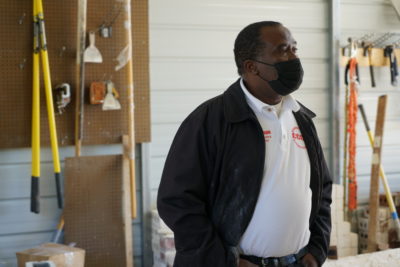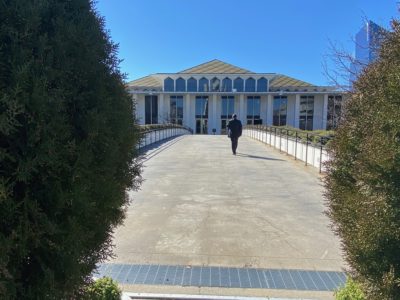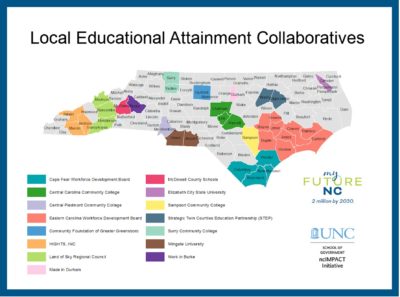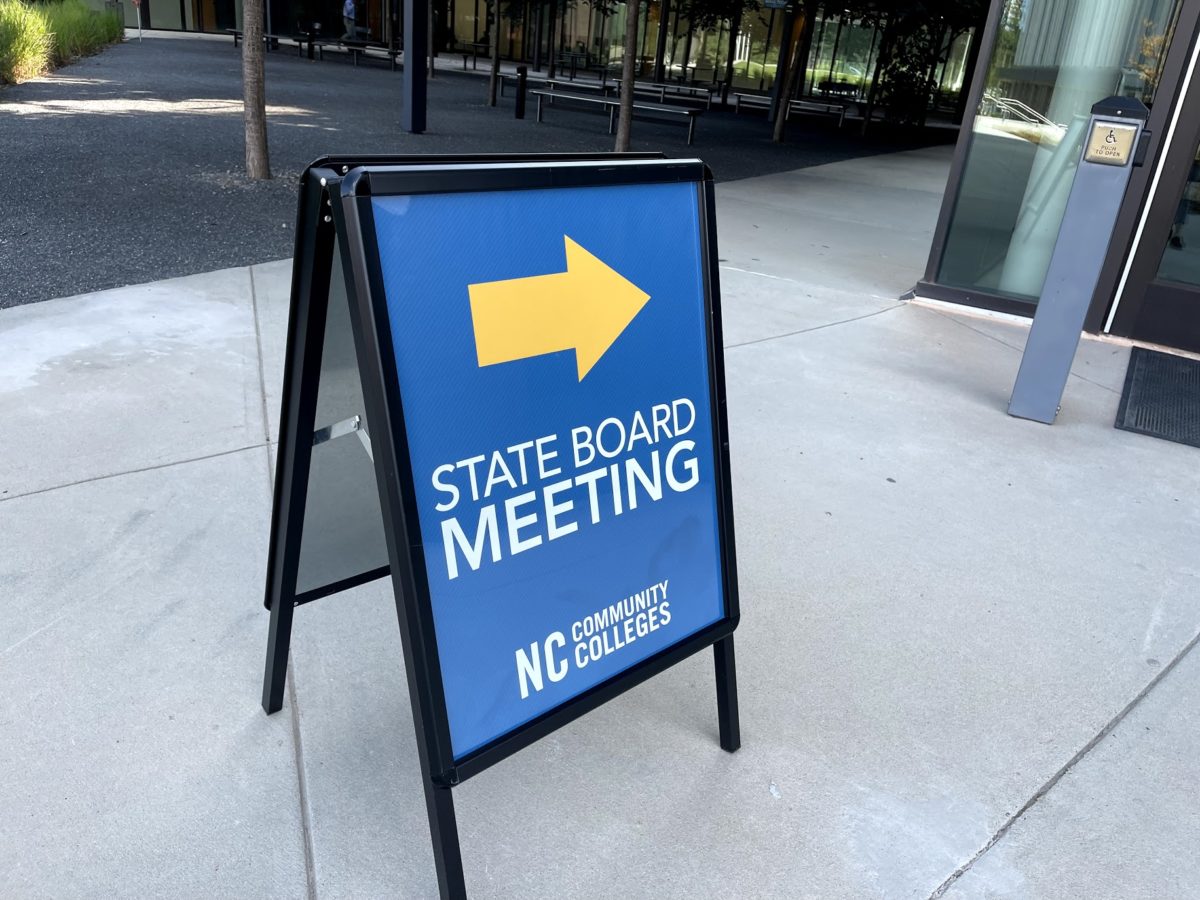
|
|
The State Board of Community Colleges met July 15 -16 at Wake Technical Community College’s RTP campus. It was the Board’s first in-person meeting since January 2020 and system president Thomas Stith’s first time meeting in person since his hire in January 2021.
Highlights from the meeting include the approval of recommendations for current and future community college performance measures and the approval of a proposal for a uniform articulation agreement between the UNC System and the North Carolina Community College System (NCCCS) for teacher preparation programs.
The audit committee discussed the financial audit findings of Roanoke-Chowan Community College and Rowan-Cabarrus Community College.
The Board approved the allocation of $4.9 million to community colleges for student support services as part of the Longleaf Commitment Grant and $3.5 million as part of the Longleaf Complete Grant.
The finance committee shared year-end estimated receipts, which included an almost $20 million deficit in tuition budget. Committee members noted the system fared better than expected given enrollment declines across the state.
New board members
The Board kicked off their Friday meeting by recognizing five new members appointed by Gov. Roy Cooper: Sam Searcy of Holly Springs, Dr. Shirley Carraway of Winterville, Raymond Trapp of Durham, J. Anthony “Andy” Penry of Raleigh, and Sarah West of Chapel Hill.
Each member will serve a six-year term.
In addition to welcoming five new members, the Board elected Dr. Breeden Blackwell as chair, and William “Bill” McBrayer as vice chair. Both will serve two-year terms.
The Board also approved the selection of Dr. Patty Pfeiffer as interim president of Wayne Community College.
Performance measures
The Board approved recommendations for current and future state performance measures as well as the 2021 Performance Measures Report.
According to Board documents, “The Performance Measures for Student Success Report is the North Carolina Community College System’s major accountability document.”
The annual report is based on data compiled from the previous year and informs colleges and the public on the performance of the 58 community colleges in North Carolina. The 2021 Performance Measures Report approved by the Board will be published on the NCCCS website. A draft copy of the report can be read here.
A review process occurs every three years to ensure the measures and methods for evaluating colleges are current and focused on improving student success.
In November 2020, a committee was formed to facilitate the 2020-21 review and make recommendations to the performance measures.
Committee chairs Dale McInnis, president of Richmond Community College, and Bill Schneider, associate vice president for research and performance management at the NCCCS, presented their findings and recommendations at the July Board meeting.
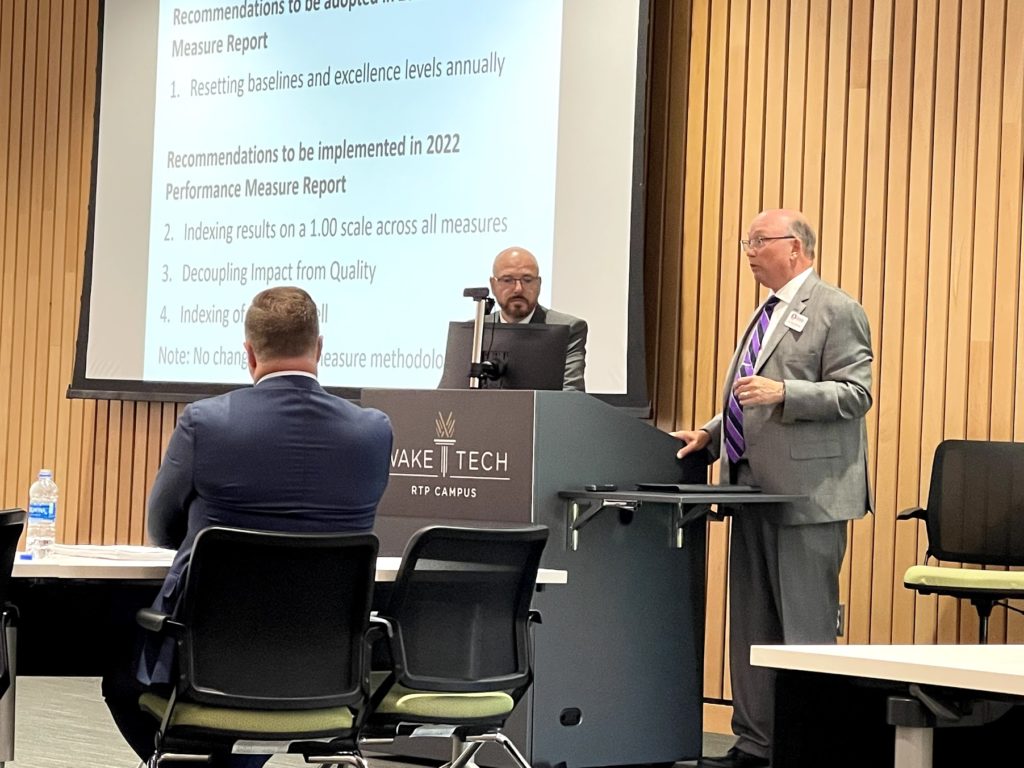
The committee identified measures that they stated were more current, relevant, and would provide incentives to colleges. According to McInnis, these measures would better align with the Board’s strategic plan and the myFutureNC attainment goal.
To better respond to the external factors that influence success rates of students, including the adverse impacts of COVID-19, the committee recommended annually resetting baselines and excellence levels. This recommendation will be adopted in the 2021 Performance Measures Report.
The committee also recommended indexing Pell/Non-Pell students, which will be implemented in the 2022 Performance Measures Report. The committee “zeroed in on the opportunity to place greater weight on the success of Pell grant recipients,” said McInnis.
To support the statewide goals of myFutureNC, the committee recommended including workforce continuing education programs that have equivalent curriculum programs in the impact component of the completion measure. This recommendation will be implemented in the 2023 Performance Measures Report.
The full list of recommendations is available here.
Articulation agreement for teacher preparation programs
The Board approved the proposal for a uniform articulation agreement between the UNC System Educator preparation programs and the NCCCS Associate in Arts Teacher Preparation and Associate in Science Teacher Preparation programs.
During the programs committee meeting, Kim Gold, senior vice president and chief academic officer of NCCCS, reminded the Board that in the 2017-18 academic year there were 1,621 teacher vacancies in North Carolina public schools.
“Community colleges have a big role to play in filling those vacancies,” Gold said.
Gold told the Board that the agreement took many conversations and real work in partnership, but they brought it across the finish line.
“I really appreciate our UNC System partners for coming to the table. There’s a lot required to become a licensed teacher in North Carolina because it’s a very important position,” said Gold.
As of May 2021, 50 community colleges offer the Associate in Arts in Teacher Preparation and Associate in Science in Teacher Preparation programs. The UNC System has 15 participating institutions.
The UNC System will meet July 21-22 and is expected to vote on the articulation agreement.
The NCCCS and the North Carolina Independent Colleges and Universities signed the Teacher Education/Educator uniform articulation agreement in November 2020.
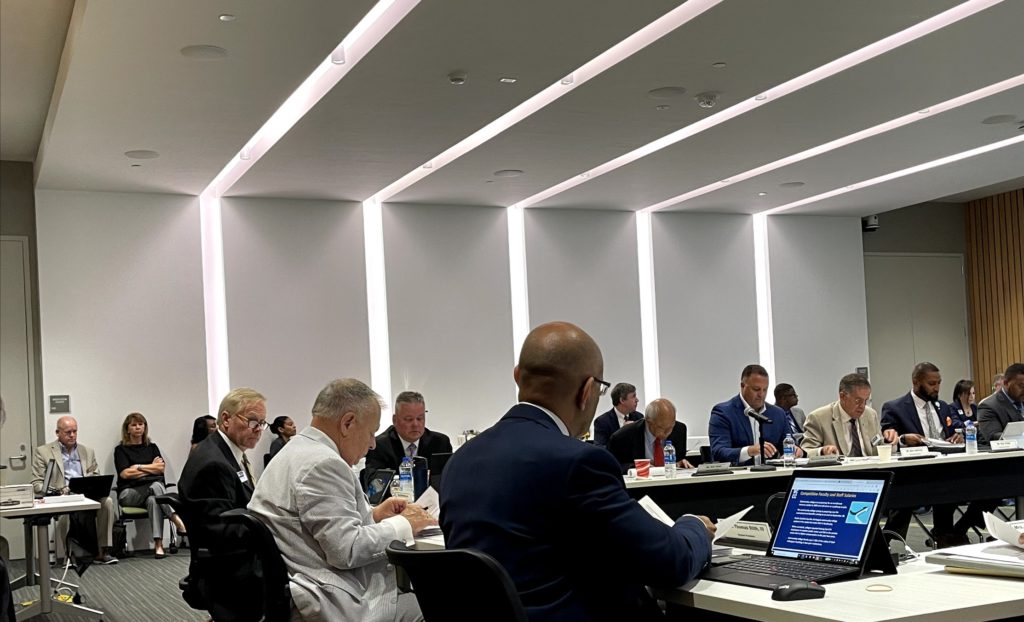
Audit findings
During the audit committee meeting, members discussed the audit findings of Roanoke-Chowan Community College and Rowan-Cabarrus Community College. The audits were conducted by the Office of the State Auditor, Beth A. Wood.
Rowan-Cabarrus Community College’s audit report found that the college’s financial statements contained significant misstatements and were not reviewed by an individual independent from the preparer.
The audit report for Roanoke-Chowan Community College found lack of internal controls increased the risk of fraud and undetected errors. Specifically, reconciliations of bank accounts were not completed between October 2019 and June 2020.
Both colleges had the opportunity to respond to the state auditor’s findings and recommendations.
In a letter to the state auditor, Rowan-Cabarrus Community College President Carol Spalding said the college agreed with the audit findings and recommendations. Spalding acknowledged significant turnover in their business office over the past few years and the impact it has had. Spalding noted that the college took the audit very seriously and has started to rebuild the business office to ensure adequate controls are in place.
Read the full letter here.
Roanoke-Chowan Community College President Murray Williams also said the college concurred with the audit findings and recommendations. In her letter, Williams laid out a plan for each finding, which included the corrective actions planned, the anticipated date of action, and the contact information for the person responsible for implementing the corrective action.
Like Spalding, Williams acknowledged the significant turnover in their business office and described how Roanoke-Chowan Community College has started to rebuild it.
Read the full letter here.
Finances
The finance committee reported the tuition and fees that were collected through June 30, 2021.
NCCCS experienced a tuition shortfall this year, according to a finance committee report. Overall, the NCCCS was about $20 million short of the tuition budget.
“While we did end up with a shortfall,” said Lisa Estep, vice chair of the finance committee, “this is a pretty amazing recovery. In February, we had probably one of the worst months that I can remember.”
On May 24, Cooper announced the Longleaf Commitment Grant, which guarantees eligible 2021 North Carolina high school graduates $700 to $2,800 per year for tuition and fees for a total of two years.
As part of the Longleaf Commitment Grant, the Board approved the allocation of $4.9 million to community colleges for student support services. The funds will be used to expand evidence-based practices, including student advising, success coaching capacity, and related investments such as technology support.
To receive this funding, some colleges will be required to match a certain percentage. The matching requirements are based upon each college’s presidential salary grade, which is based on Full-Time Equivalent, or FTE.
| GRADE 1 FTE less than 2,500 | 0% Match |
| Grade 2 FTE 2,500-6,499 | 20% Match |
| Grade 3 FTE 6,500 and greater | 40% Match |
You can view each college’s matching requirements here.
In addition to the $4.9 million, the Board approved the allocation of $3.5 million to community colleges for the Longleaf Complete Grant. The Longleaf Complete program is designed to reengage current or former students who are at least 50% toward the completion of their degree or credential.
According to Board documents, “Prior to the pandemic, more than a million North Carolinians had some college credits but no degree. During the pandemic, 3 in 10 adults who planned to go to college canceled their plans.”
The Longleaf Complete funds will be allocated based on curriculum budget FTE. You can view the allocation of funds for each college here.
Looking ahead
In her last report as president of the North Carolina Association of Community College Presidents (NCACCP), Kandi Deitemeyer, president of Central Piedmont Community College, recalled the first report she gave in August 2020.
“I said the word for the year would be ‘grace,’” she said.
Deitemeyer went on to talk about the perseverance of the 58 community college presidents, saying she had never been more proud of her colleagues and friends.
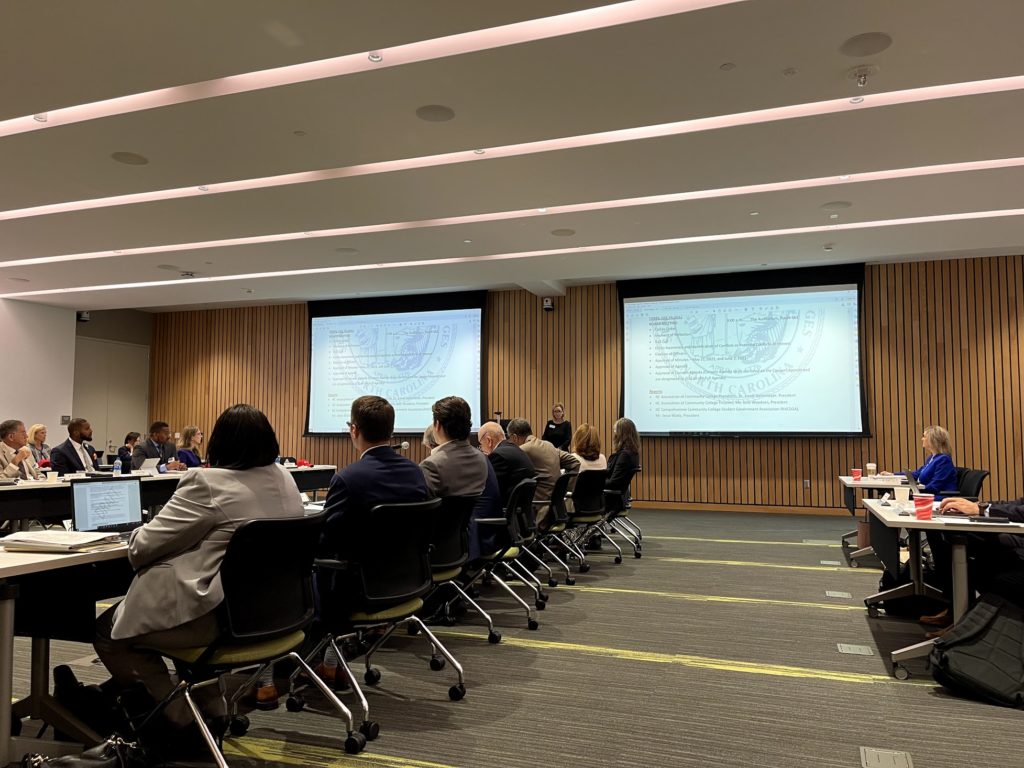
Despite the challenges of the past year, North Carolina community colleges awarded 60,770 credentials from June 2020 to July 2021 – a number that will increase once the summer semester concludes.
“Their completion and success was and will always be our great and collective accomplishment.”
Kandi Deitemeyer, president of Central Piedmont Community College.
While encouraged by the Senate budget’s investment in community colleges, Deitemeyer called attention to faculty and staff salaries.
“We must receive a minimum of 5%,” she said.
Mark Poarch, president of Caldwell Community College & Technical Institute (CCC&TI) will serve as the next president of the NCACCP.
Echoing Deitemeyer, Stith highlighted the need for a minimum of a 5% salary increase for faculty and staff.
Stith also highlighted his recent visits to eight community colleges, bringing the total number he’s visited since January to 20.
In his concluding remarks, Stith stressed the importance of working together as a system:
“I believe in the integrity of our community colleges. We are stronger when we work together as a system. We certainly have our unique initiatives and unique programs at each college. But if we are not unified, if we’re not working together as a 58-college system, working together as a Board, we will not be as strong.”
Thomas Stith, president of North Carolina Community College System.
The next State Board meeting is scheduled for Aug. 19 – 20 in the Dr. W. Dallas Herring State Board Room located in the Caswell building in Raleigh.
Recommended reading
